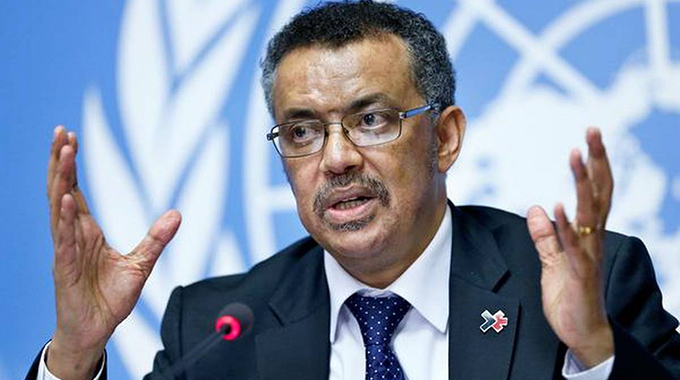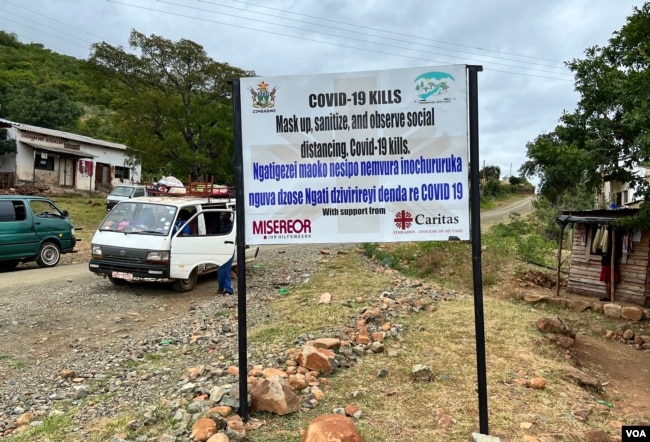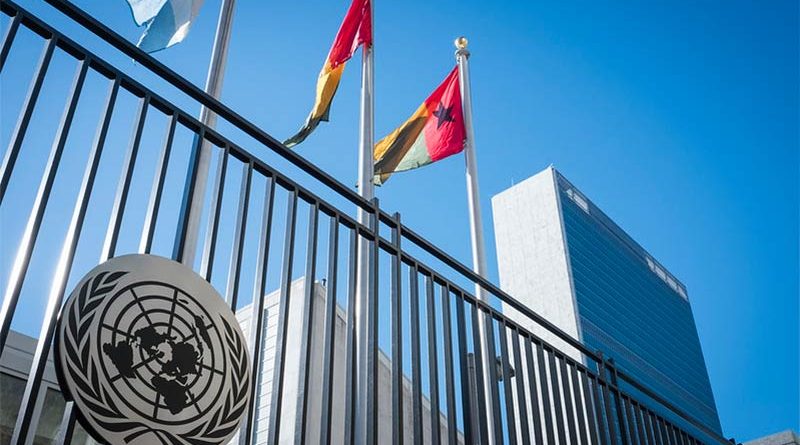A contribution of €16 million from the European Commission's Directorate-General for European Civil Protection and Humanitarian Aid Operations (ECHO) will help the World Health Organization (WHO) boost COVID-19 vaccination campaigns and increase coverage in 15 African countries, where only 15 percent of the population is vaccinated.
The funding is part of the European Union's (EU) humanitarian initiative for COVID-19 vaccination in Africa, which aims to ensure increased access for the most vulnerable and those living in hard-to-reach, remote and conflict-affected areas.
The EU also supports the COVAX Facility, the vaccines part of the Access to COVID-19 Tools Accelerator created to develop and deliver tools to fight the pandemic.
"Solidarity is key to ending this pandemic and to building back better,” said Dr Hans Henri P. Kluge, WHO Regional Director for Europe. “These are not just words. These principles have been already exemplified by the generous support with vaccines and funding provided by the European Union to the global pandemic response. Together in Europe, in Africa and beyond, WHO and the EU are working with local partners to ensure COVID-19 vaccination reaches the arms of everyone and that lessons learned contribute to resilient health systems.”
Read the full Press Release here.
HARARE, ZIMBABWE —
The World Health Organization says Africa’s COVID-19 vaccinations rose by 15% between January and February, as several countries embarked on mass inoculation drives to expand coverage and protect populations from the pandemic.
Zimbabwe’s government says it is launching a "national vaccination blitz" targeting those who have not yet been vaccinated in a country where resistance to the shots has been an issue since the program started last year. The drive come amid government concern over rising COVID-19 cases.
Dr. Matshidiso Moeti, WHO regional director for Africa, said in a statement that the increase in COVID-19 vaccinations on the continent was driven mainly by campaigns in populous countries, including the Democratic Republic of Congo, Ethiopia, Kenya, and Nigeria.
Dr. Thierno Balde, the WHO Africa regional COVID-19 incident manager, he says the continent must remain vigilant.
“We have seen what is happening around, in China, and the risk of also having new imitations, new variants still possible. We really need to continue to safeguard our population by taking the vaccine by not relaxing totally. The situation might change. So we really need to continue adapting some of these social measures and also to get a vaccination,” Balde said.
The WHO said to boost African COVID-19 vaccine acceptance, it and other organizations were supporting mass vaccination drives in at least 10 priority countries to reach 100 million people by the end of next month.
Nqobizitha Mangaliso Ndlovu, Zimbabwe’s acting information minister, said his country would not be left behind.
“Regarding the vaccination program, as of 15 March, 2022, a total of 159,628 third doses have been administered to date. The national vaccination blitz campaign will kick off on Monday, 21 March, 2022, and [the] government is urging those that have not yet been vaccinated to take advantage of this exercise to do so,” Ndlovu said.
A number of Zimbabweans have refused vaccination, saying they do not trust the mainly donated Chinese-made Sinopharm and Sinovac vaccines. The country has lately recorded a rise in new infections – now cumulatively at 244,012 with 5,418 deaths, according to the Johns Hopkins University, which is tracking the global outbreak.
Dr. Cleophas Chimbetete, president of Zimbabwe College of Public Health Physicians, attributes that to the recent lifting of restrictive measures, such as lockdowns. He says, however, it is not time to panic, just to enforce WHO protocols, such masking and social distancing.
“After relaxing measures, it is expected that cases will slightly go up. But I also think that it is too early to make any meaningful conclusions, I think it is just an opportunity for us to strengthen our preventative measures and continue highlighting to the rest of the population that COVID is still with us. The good news, though, is that severe cases have not gone up. What we need to do is to continue to get vaccinated and what is important is that the government should – as it is doing – is monitor these numbers. There is no cause for alarm or cause for us to introduce new measures,” Chimbetete said.
Zimbabwe had a target of vaccinating at least 10 million people by the end of last year, a figure that some say was difficult to reach given the scarcity of resources and hesitance. It has yet to announce when it plans to achieve herd immunity.
Newly reported cases fell by 20 per cent in the week that ended on 16 January, while deaths dropped by 8 per cent.
South Africa, where the Omicron variant was first sequenced, and which has accounted for the bulk of cases and deaths, has now recorded a downward trend for the past four weeks.
Cases also fell across the rest of the continent, with only North Africa reporting an increase in cases, with a 55 per cent spike.
The Omicron variant has now been reported in 36 African countries, and 169 nations all over the world.
‘Yet to turn the tables’ on COVID
According to WHO’s Regional Director for Africa, Dr. Matshidiso Moeti, the acceleration, peak and decline of this last wave has been “unmatched”, but its impact has been moderate, with fewer deaths and lower hospitalizations.
Despite those numbers, Dr. Moeti believes that Africa “has yet to turn the tables on this pandemic.”
“So long as the virus continues to circulate, further pandemic waves are inevitable. Africa must not only broaden vaccinations, but also gain increased and equitable access to critical COVID-19 therapeutics to save lives and effectively combat this pandemic,” she said.
Fatality ratio
The current case fatality ratio (the death toll per infections) in the continent remains the highest in the world, although it dropped during the last two waves of variants.
In terms of medication, patients with severe forms of the virus are being treated with corticosteroids and medical oxygen. Corticosteroids are largely available and relatively affordable, but availability of medical oxygen remains a challenge.
In addition, African countries face major impediments in accessing other treatments due to limited availability and high cost.
Last week, WHO recommended two new drugs, raising the number of WHO approved therapeutics to 11, and the agency is now reviewing the data on two oral medications that promise to reduce risk of hospitalization.
Following negotiations with the Swiss pharmaceutical company Roche, the agency is supporting the shipment of a limited number of vials of Tocilizumab, a drug used to treat patients with severe cases.
Cape Verde and Uganda have already received vials. Burkina Faso, Ghana and Tanzania are due to receive some in the next few weeks.
Further larger-scale deliveries are expected, with negotiations underway through the ACT-Accelerator partnership.
Fair access
For Dr. Moeti, the deep inequity that left Africa behind on vaccines must not be repeated with life-saving treatments.
“Universal access to diagnostics, vaccines and therapeutics will pave the shortest path to the end of this pandemic and no region of the world should be left on the fringes of this endeavour,” she said.
Even though vaccine supplies have been on the rise, the rate of vaccination remains low, with just 10 per cent of the continent’s population fully vaccinated.
Africa has so far received about 500 million vaccine doses and administered 327 million.
According to Dr. Moeti, significant efforts are needed to ramp up the vaccination to reach a broad swathe of the population.
By mid-2022, the UN-backed COVAX Facility expects to have enough supply for all participant countries to fully vaccinate 45 per cent of their populations.
Source : UN News
ACCRA, Dec 13 (Reuters) - The operator of Ghana's main international airport will fine airlines $3,500 for every passenger they fly in who is not vaccinated against COVID-19 or who tests positive for the coronavirus upon arrival, it said on Monday.
The rule comes into effect on Tuesday at Kotoka International Airport in the capital Accra, Ghana Airports said. It follows a health ministry move last week to require all people entering Ghana to be vaccinated.
The measures are some of the strictest in Africa, where vaccine uptake has been challenged by lack of supply and logistical issues even as the new Omicron variant raises concerns about quicker transmission of the virus.
Ghana's tightening of restrictions comes as the European Investment Bank announced a 75-million-euro ($85 million) investment loan to support its pandemic response - the largest such support for a COVID-19 programme in Sub-Saharan Africa.
"Ghana has taken significant steps to manage the impact of COVID and to unlock long-term investment," EIB President Werner Hoyer said in a statement.
The authorities launched a massive vaccination drive this month ahead of the enforcement from Jan. 22 of a vaccine mandate for targeted groups, including government employees, health workers and students. It plans to recruit more health workers to be able to double daily inoculation from 140,000.
Ghana, one of West Africa's largest economies that runs on exports of cocoa, gold and oil, has so far vaccinated slightly more than 5% of its population of 30 million, data compiled by Reuters showed.
Its health service has recorded 131,412 infections and 1,239 deaths from COVID-19, according to the data.
Over the last two weeks, COVID-19 cases recorded at Kotoka airport accounted for about 60% of total infections in the country, the health service said on Friday. ($1 = 0.8857 euros)






